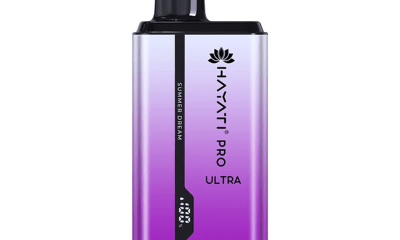Health
Benefits of Maintaining Healthy Testosterone Levels
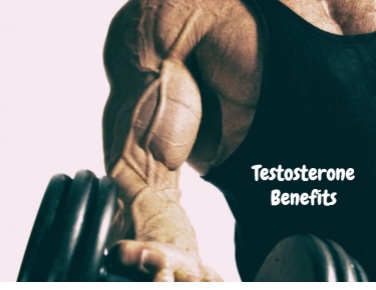
Testosterone is a hormone that is naturally produced by the body. It’s responsible for many important functions in both men and women, including sexual development, muscle mass, bone density, fertility, and much more.
But when testosterone levels drop below the recommended range for men—which can occur due to age or medical conditions—it can lead to some serious health issues.
Testosterone hormone is essential for the development of male reproductive tissues. It also plays an important role in regulating other functions of the body such as muscle mass, bone density, and sex drive.
If a man’s testosterone levels are too low, it can lead to various health issues. There are many effective testosterone supplements over the counter that help boost testosterone production in the body.
In this article, we will discuss how healthy testosterone levels can improve your life.
Read on to learn about the benefits of maintaining healthy testosterone levels.
Benefits of Healthy Testosterone Levels
Healthier testosterone levels provide numerous benefits for men including improved mood regulation, increased sex drive, and increased muscle mass.
However, it is important for men to consult with their doctors before taking any supplements or making drastic lifestyle changes related to increasing their testosterone levels as these measures could potentially result in adverse side effects if not undertaken correctly under proper medical supervision.
Additionally, healthy lifestyle choices such as regular exercise and eating well-balanced meals can help maintain optimal testosterone levels without any additional supplementation being required!
All these steps together should ensure that you reap all the benefits associated with having healthy testosterone levels!
Physical Benefits
One of the most well-known benefits to optimizing testosterone levels is increased physical performance. Studies have shown that boosting testosterone can increase muscle mass, lean body mass, strength, power, endurance and aerobic capacity. This makes it a great option for athletes who are looking to improve their performance in the gym or on the field. It can also be beneficial for those looking to reduce body fat percentage.
Testosterone hormone has impact on almost all body function including voice frequency and voice pitch. Studies report hat testosterone may also lower your voice.
Increased testosterone has also been linked to reductions in fatigue and an increase in energy levels.
Mental Benefits
In addition to physical performance gains, there are mental benefits associated with increasing your testosterone levels as well. Studies have suggested that higher testosterone levels correlate with improved cognitive function including better memory recall and improved learning abilities.
Additionally, higher testosterone can give you a greater sense of confidence which may result in improved social interactions as well as reduced stress level.
Muscle Mass and Bone Density
Testosterone helps build muscle mass and strength. When it drops below the normal range, it can lead to decreased muscle mass and even weakness in some cases. Low testosterone levels are also associated with an increased risk of osteoporosis or weakened bones due to decreased bone density.
Testosterone plays an important role in muscle growth as it helps build muscle mass by stimulating protein synthesis within the body’s cells. Men who have higher levels of testosterone tend to have greater muscle mass than those with lower levels of the hormone due to its effects on protein synthesis.
Not only does this help them look better but also improves their performance during physical activities like sports or workouts at the gym.
Mood Regulation
Low testosterone levels can cause depression, anxiety, and irritability in men. Studies have shown that men who have higher testosterone levels tend to be more relaxed and confident. This can lead to increased productivity at work and better relationships with family and friends.
Additionally, when men are more relaxed, they are able to focus on their tasks with greater clarity and be more productive throughout the day.
Low testosterone levels have been associated with depression, low libido, fatigue, and irritability in both men and women. Studies have shown that increasing testosterone levels can help improve mood and brain productivity significantly in those who experience these symptoms as a result of low testosterone levels.
Improved Sex Drive
A healthy level of testosterone helps improve a man’s libido or sex drive. When testosterone levels are low, men may experience a decrease in sexual desire or interest which can lead to issues in relationships with their partners or even depression if left untreated.
Studies have found that when men increase their testosterone levels through supplementation or lifestyle changes such as exercise and dieting, they often report an increase in libido which leads to improved sexual performance.
Healthy Weight Management
Finally, increasing testosterone can be beneficial for healthy weight management as well as sexual health concerns such as erectile dysfunction or low libido.
Higher estrogen is associated with increased fat storage around your waistline; so by optimizing your hormone balance (including estrogen) you may be able to reduce stubborn belly fat more easily than relying on diet and exercise alone.
Improved Libido and Fertility
In men, low testosterone levels can lead to infertility due to decreased sperm production. In women, it can cause irregular menstrual cycles or other hormonal imbalances that may interfere with conception or carry risks during pregnancy. Increasing testosterone levels has been shown to improve fertility rates in both sexes.
Low libido is one of the most common symptoms of low testosterone levels in both men and women. Increasing testosterone levels has been shown to increase libido significantly in those who are experiencing this symptom as a result of their low hormone levels.
Conclusion
Healthy testosterone levels are important for maintaining good overall health for both males and females alike. It plays an important role in sexual development, muscle mass, bone density, fertility rates, libido, and even moods!
If you think your hormone level might be lower than normal for your age or gender group, speak with your doctor about potential treatments that could help restore them back into the normal range! Maintaining healthy testosterone levels is just one step towards achieving better overall health!
Improving your hormone balance can lead to a host of positive effects—both physical and mental—and optimizing your testosterone is no exception!
From physical performance improvements like more strength and less fatigue to mental clarity gains like improved cognition and increased confidence—healthy levels of testosterone have something for everyone!
For those looking for weight loss assistance or sexual health improvements you’ll likely find some relief through proper hormone balancing as well!
The best way to know if boosting your testosterone will provide any benefit is by talking with a medical professional about having your hormone levels checked today!
Health
The Hidden Dangers of Dehydration: How It Affects Your Body


Dehydration is more than just feeling thirsty; it can significantly impact your body and its functions. Staying hydrated often takes a backseat with summer heat waves, strenuous activities, and busy schedules. Understanding how dehydration affects your body and discovering effective solutions, such as IV therapy, can make a world of difference in maintaining your health and well-being.
The Effects of Dehydration on the Body
Water is essential for nearly every function your body performs. When you don’t consume enough fluids, your body begins to experience a range of adverse effects. Here are some of the key ways dehydration impacts your body:
Reduced Cognitive Function: Dehydration can impair brain function, affecting concentration, memory, and mood. Even mild dehydration can cause headaches, dizziness, and fatigue, making it hard to focus on tasks.
Physical Performance: Dehydration can significantly hinder physical performance for athletes or those who engage in regular exercise. When the body lacks sufficient water, muscle cramps, decreased endurance, and a higher risk of heat-related illnesses are expected.
Digestive Issues: Water aids in digestion by helping break down food and absorb nutrients. Dehydration can cause constipation and other digestive discomforts, as your body struggles to process food without adequate hydration.
Kidney Function: Your kidneys rely on water to filter waste from the blood and produce urine. Chronic dehydration can lead to kidney stones and even kidney damage over time.
Skin Health: Your skin is the largest organ and needs water to maintain its elasticity and suppleness. Dehydrated skin can appear dry, flaky, and more prone to wrinkles.
Cardiovascular Health: Dehydration reduces blood volume, making it harder for your heart to pump blood efficiently. This can lead to increased heart rate and low blood pressure, potentially causing serious complications.
Combatting Dehydration with IV Therapy
While drinking water is the most straightforward way to stay hydrated, there are times when our bodies need a more immediate solution. IV therapy offers a fast and efficient method to rehydrate and replenish essential nutrients.
What is IV Therapy?
Intravenous (IV) therapy directly infuses fluids, vitamins, and minerals into the bloodstream. This method allows for 100% absorption of these vital substances, bypassing the digestive system and providing immediate hydration and relief.
Benefits of IV Therapy for Dehydration
Rapid Rehydration
IV therapy from IV Minnesota delivers fluids directly into the bloodstream, allowing for quick and efficient rehydration. This is especially beneficial for severely dehydrated individuals or those unable to consume enough fluids orally.
Electrolyte Balance
Dehydration often leads to an imbalance of electrolytes like sodium, potassium, and magnesium, which are crucial for various bodily functions. IV therapy can include these electrolytes, helping restore balance and prevent complications such as muscle cramps and irregular heartbeats.
Enhanced Nutrient Absorption
IV therapy can include vitamins and minerals that boost your immune system, improve energy levels, and support overall health. This is particularly useful for individuals with nutrient deficiencies or those recovering from illness.
Improved Recovery
Athletes and fitness enthusiasts often use IV therapy to speed up recovery after intense workouts. Combining fluids and nutrients helps reduce inflammation, muscle soreness, and fatigue, promoting quicker recovery times.
Convenience and Customization
IV therapy sessions are typically quick, lasting 30 to 60 minutes. Treatments can be customized to address specific needs, such as hydration, energy boost, or immune support.
Conclusion
Dehydration can profoundly impact your health, affecting everything from cognitive function to skin health. Recognizing dehydration’s signs and its effects is crucial for maintaining your well-being. While drinking water remains essential, IV therapy is a powerful tool for combating dehydration, providing rapid rehydration and other health benefits. Whether you’re recovering from a strenuous workout, an illness, or simply looking to boost your overall health, IV therapy can be an effective and convenient solution. Stay hydrated, stay healthy, and consider the benefits of IV therapy as part of your wellness routine.
Health
Hyperbaric oxygen therapy aids in natural healing
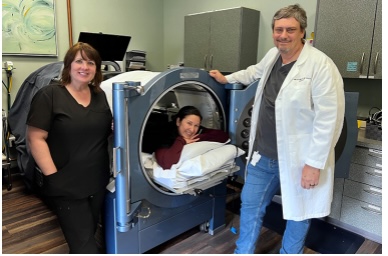

Natural healing is the process of the body through which it resists any external factor to change its internal environment. This resistance to the external factors is done by the system called the immune system. Healing requires the growth and production of new cells and removal of old worn out cells. This is done by the body itself but requires proper fuel for this and the fuel is no doubt, OXYGEN!
How does hyperbaric oxygen therapy boost the immune system?
For proper natural healing, the white blood cells require a generous amount of oxygen rich blood to knock out the bacteria. This oxygen level is not met in a normal environment. Because under normal conditions very little oxygen is carried out by the red blood cells.
This will lead to slow or sometimes no natural healing. In such circumstances, bacteria overcome the body and lead to infection. Such infections are really common especially in wounds. Then, high doses of antibiotics are indicated.
To prevent such circumstances, hyperbaric oxygen therapy is a good option. As we all know, oxygen is supplied under high atmospheric pressure. This will cause a tenfold increase in oxygen concentration of blood plasma, leading to the rush of oxygen rich blood to the affected site and thus strengthening the immune system.
HBOT provides adequate oxygen to the white blood cells and also flushes out the toxins out of the body, which leads to the strengthening of the immune system thus accelerating natural healing.
How does it supports in healing of the body:
Immune system only stops and kills bacteria but the damaged cells also need to be repaired. Our bodys have a natural tendency to repair itself. This is done through cell division and apoptosis (programmed death of worn out cells). All this process needs a proper supply of oxygen rich blood to the targeted site.
The damage of the cells is always followed by the inflammation of surrounding blood vessels which comprise the blood supply and cause delayed healing. The high oxygen saturation from HBOT enhances the ability of red blood cells to change their shapes. This allows them to pass through the inflamed vessels thus accelerating the healing process.
The research evidence is still not very strong but most of it supports this. The oxygen fluctuation due to HBOT therapy causes the release of growth factors in the body. These growth factors help to grow the new cells which replace the older worn out cells. Thus helps in growth and healing.
A study published in 2008 showed that hyperbaric oxygen therapy is helpful in the healing of diabetic foot ulcers. The mechanism behind it is similar to natural healing.
Is it safe?
HBOT is preventive and supportive therapy. It is non-invasive and painless and brings comfort to the user, so it is safe to use. The use of HBOT for rejuvenation, healing and preventive purposes is usually harmless. However, the timing of the sessions should be within normal limits because “excess of everything is bad.” You can have your own HBOT chamber in your house and can have your session anytime. They are user friendly so you can use them easily.
What are the protocols ?
HBOT is a simple therapy which is most commonly used for the preventive and rejuvenating purposes. The protocols of HBOT are following:
- The duration of each session ranges from 30 minutes to 120 minutes. It totally depends upon the goal.
- In general, for health optimization the duration should be 60 minutes.
- The pressure ranges are 1.5 to 3 atm
- For central nervous system benefits, the pressure should be from 1.5 to 2 atm
- For other health benefits higher pressures can be used.
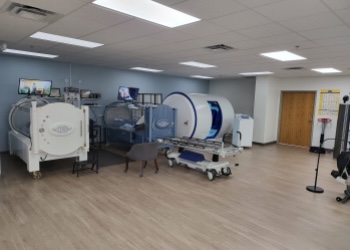

Which is the best HBOT chamber in the market?
This might be the next question popping in your mind. The answer to this question is Oxyhelp Hyperbaric Chambers. They produce the most luxurious and reliable oxygen chambers that money can buy today.
They are user friendly and pocket friendly. The internal environment is designed according to the comfort of the user and is completely antiseptic. The sealed doors and internal controller are also marking features.The size of the chamber is also accommodating so you don’t need to worry about the space. In a nutshell, Oxyhelp chambers are all in one deal so grab yours ASAP!
Health
Mastering AG-PCNP psychomotor skills for optimal care
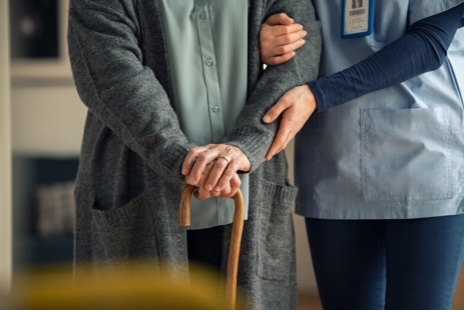

Adult-gerontology primary care nurse practitioners (AG-PCNPs) know that psychomotor skills are at the heart of their practice. Specifically, the ability to perform physical examinations, administer medications accurately, and handle diagnostic procedures are big parts of their role. Each of the skills we’ll discuss today is equally important, and when they’re all mastered, the end result is an AG-PCNP who is able to thrive in their role.
The life of an AG-PCNP
Before drilling down into specific skills, let’s first take a look at what the role of an AG-PCNP actually is. Essentially, it’s a role that bridges the gap between nursing and medical care, and it’s specifically tailored to adults and the elderly. The role involves comprehensive patient management, from initial assessment to diagnosis, treatment, and follow-up care.
They start their day reviewing charts and preparing for rounds. They will actively move through clinical settings and conduct thorough physical examinations. They check abdomens to detect even subtle changes or perform complicated joint injections that demand precision.
The patients they see are diverse but are unified by their stage in life. They’re adults with complex health needs that have often been exacerbated by aging. AG-PCNPs assess the full picture of patients’ health situations and often have to manage multifaceted conditions such as diabetes or heart disease. At the same time, they take into consideration age-specific issues such as mobility challenges or cognitive decline.
Throughout their workday, they will collaborate with physicians, therapists, dietitians, social workers, and healthcare professionals of many other disciplines. This collaboration could be as simple as aligning on a care plan, or it might involve working together on more complicated tasks such as catheterizations or biopsies. Throughout all of these parts of the role, strong psychomotor coordination is required.
Conducting physical examinations
When assessing patients, especially older adults, you must fine-tune your approach. These examinations are more than just a routine check-up. They require an attentive eye and skillful hands that can identify even subtle changes or concerns.
Combining both diagnostic technology with traditional hands-on techniques can be a good approach. You may use Doppler devices to evaluate heart health or employ different tools for capturing detailed images of skin lesions. These technologies can complement your palpation and observational skills and provide you with more information to make a diagnosis.
Neurological exams on elderly patients are especially important, but they must be approached with caution. Your expertise will allow you to differentiate between normal age-related changes and non-normal ones. Tasks such as reflex testing and coordination assessments are common in these types of exams.
Mastering diagnostic procedures
To master diagnostic procedures, you need a deep understanding of lab results and imaging studies. You must be able to read between the lines, recognizing not just the obvious, overt signs, but also the subtle indicators that something is wrong. The tools that you use are extremely valuable, but how to interpret the results is more important.
Advanced biopsy techniques are another key skill that you’ll require. This is particularly true when it comes to cancer screenings, where early detection can make all the difference. Familiarize yourself with different types of biopsy methods and focus on obtaining tissue samples both safely and effectively while causing as little discomfort to patients as possible. At the risk of reiterating the same point, interpretation is everything. You must learn how to interpret these samples accurately.
When you’re conducting heart-related diagnostic procedures, you’ll typically be using electrocardiograms (ECGs) and stress tests. You’ll need to understand different ECG patterns and what they mean. This will help you to identify arrhythmias, ischemic changes, or other cardiac anomalies. You can then use this information to identify anything that requires immediate attention or needs a long-term management strategy.
Diagnostics and procedures are such an important part of gerontology that many schools will focus part of their curriculum entirely on this area. The University of Indianapolis is one of these schools, with its online AGNP program featuring a full class on diagnostics and procedures. The program can be completed in just 32 months, and is conducted in a part-time online format to accommodate working nurses.
Precise medication administration
Another key skill for AG-PCNPs is being able to precisely administer medication. This is not just about dosage, but also about management and educating patients. Elderly patients often take multiple medications at the same time. To manage this, you must have strategies in place to review current prescriptions regularly. Prioritize the medications that are necessary and discontinue those that may no longer be beneficial or could cause adverse interactions.
When it comes to administering injections, you aim for techniques that reduce discomfort as much as possible without sacrificing the absorption of the medicine. This is true of both subcutaneous and intramuscular injections. This could involve using the smallest gauge needle possible for the medication or rotating through different injection sites to prevent tissue damage. Applying gentle pressure after the injection without massaging the area can be a good idea, too.
When dealing with high-risk medications such as anticoagulants, insulin, and chemo drugs, you must be switched on. The high power of these drugs means that there can be big potential side effects if they aren’t administered correctly. You need a thorough understanding of how these drugs work, and you must always double-check calculations for dosages every time they’re prescribed. Make sure to implement safety checks before dispensing these medications, as well. This includes even basic things such as verifying patient identity and cross-referencing with their medical records.
Minor gerontology procedures
Something else you will find yourself doing is carrying out minor procedures that can significantly impact patient comfort and recovery. One example is addressing laceration repairs, and this is where your expertise in wound closure techniques comes to the forefront. The art of suture selection and placement is key. It’s not just about closing a gap but doing so in a way that promotes healing and discourages scarring. Some of the techniques you will need to master for this task include simple interrupted, mattress, and subcuticular stitches.
Joint aspirations and injections are other minor procedures that demand precision. Often, you’ll be doing this when treating patients with arthritis, and their pain relief will depend on how accurate and skilled you are at these procedures. Tissues around the joint may be inflamed, and you must navigate this without causing additional discomfort or damage to the joint structure. As well as having a steady hand, you’ll need a strong knowledge of anatomy to guide each needle placement as you deliver medication or take out fluid from the patient.
We’ve already mentioned biopsies once, but cryotherapy for wart treatment and lesion removals are two other examples of dermatological procedures that are performed regularly. These tasks are delicate, too, and you need to be both gentle and confident. The margins must be cleared while also making sure not to cause too much cosmetic damage. Attention to detail is very important for these procedures.
Geriatric wound care
Some older adults will develop chronic wounds such as ulcers and other non-healing injuries. These types of things are more common as our skin loses its elasticity and blood circulation diminishes as we age. AG-PCNPs need to understand the complexities of these conditions in order to be able to take care of them.
Infection control is probably the most important part of geriatric wound care. You must be vigilant about cleanliness and follow all protocols around reducing the risk of infection. An infection can often develop into something significantly worse than the wound itself, so this must be prioritized. You’ll need to assess the wounds regularly for signs of infection, too.
Selecting the right dressings is equally important. Not all products will suit every type of wound. For example, some dressings maintain a moist environment that is ideal for tissue regeneration, whereas others absorb the excess fluid or protect against bacterial contamination. You’ll need a strong understanding of what type of wound the patient has and which type of dressing makes the most sense to treat it.
The process of debridement is also important. This is where you remove dead skin or infected tissue from a patient. As you can imagine, this is a delicate process and needs to be executed skillfully. Sometimes this will include using autolytic methods, which means using dressings that are designed to self-debride.
Geriatric-specific psychomotor skills
As we age, our bodies begin to decline in different ways. This does not happen at the same time or pace for each person, which is why AG-PCNPs must be able to evaluate all of these different skills and understand what signs to look for. One example of a significant concern for older adults is the risk of falls. AG-PCNPs can focus on risk assessment and prevention by evaluating gait stability, muscle strength, and balance. They can use tools such as the Timed Up and Go (TUG) test to objectively measure mobility risks and implement any relevant interventions as needed.
When patients do require mobility aids, they also need the knowledge of how to use them correctly. This is extremely important not just for their safety, but for allowing them to maintain their independence, too. You can demonstrate how to safely get by in different terrains using walkers or canes, making sure that the patient understands and feels comfortable. For patients requiring wheelchairs, guide them through how to use them correctly and focus on ergonomics so that new injuries don’t occur.
Psychomotor skills related to our senses are something else that begins to diminish with age. As an AG-PCNP, you’ll need to have strategies in place to change your practice when dealing with patients with sensory impairments. If a patient has problems with their vision or hearing, you might need to adapt your communication style. This could be as simple as speaking with a louder voice when dealing with patients who have poor hearing.
Sometimes patients may have different forms of dementia, and this will require very patient and skillful forms of care. This could mean simplifying instructions during examinations and establishing a routine that minimizes anxiety for these patients. Use nonverbal cues as needed and always approach from the front where you can be seen clearly to avoid startling them.
Chronic disease management
Chronic diseases are something that most healthcare practitioners will have to deal with, and this is also true of gerontology. When dealing with older patients, you’ll need to focus on both technical skills and holistic plans that are very specific to each patient.
Chronic diseases that you’ll come across most commonly include diabetes, COPD, and hypertension. Each of these involves regular assessments to track the progression of the disease and how effective the treatments have been. You’ll frequently use glucometers to check blood sugar levels in diabetic patients or employ spirometry testing for those with COPD to measure their lung function. You’ll also find yourself regularly using blood pressure cuffs to evaluate patients with hypertension.
Educating your patients is an important part of this management, too. They need to know how to correctly use home monitoring devices, and this can empower them to actively participate in their own care. Simply demonstrating the proper technique for checking blood glucose or blood pressure not only enhances your patient’s autonomy but also helps ensure that the measurements they report back to you are accurate.
Beyond medication management, integrating diet, exercise, and lifestyle modifications is a big part of treating chronic illnesses. You’ll guide your patients through dietary changes that make sense to their specific needs, as well as recommend appropriate changes to their physical activity. This will be highly individualized based on any mobility limitations that they may have.
Conclusion
In many respects, the role of an AG-PCNP is an all-encompassing one. You can think of yourself as a guardian to the elderly, taking into account everything about their life and how that interacts with their health. Most of the skills you need to do this job well involve psychomotor skills, and they must be focused on. As the world’s population is becoming older, this role will only become even more important, making it the perfect choice for a long career in healthcare.
-



 Biography5 years ago
Biography5 years agoJacqulyn Elizabeth Hanley is the Mother of Liza Soberano?
-



 Home4 years ago
Home4 years agoEpson L3110 Driver Free Download Latest Updated Version
-



 Games3 years ago
Games3 years agoBest Free To Play MMORPG To Try This 2021
-



 Biography5 years ago
Biography5 years agoAmanda Levy Mckeehan Biography, Family, Net Worth, Age, Affairs, Facts
-



 Biography5 years ago
Biography5 years agoWho is Rose Dorothy Dauriac? Scarlett Johansson Daughter?
-



 Biography5 years ago
Biography5 years agoJessica Ditzel Secret Information that Nobody Knows | Joe Rogan’s Wife
-



 Biography5 years ago
Biography5 years agoWhat is the relation of Nathaniel Larry Osorno with Liza Soberano?
-



 Home5 years ago
Home5 years agoLiza Soberano Biography, Age, Family and Boyfriends



